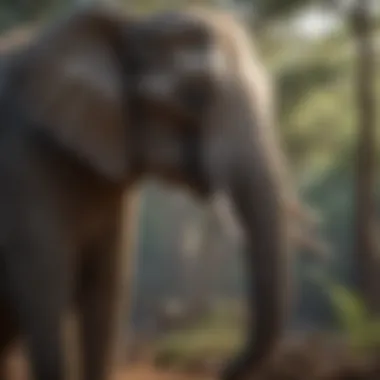Are Elephants the Most Intelligent Species on Earth? Exploring Their Cognitive Brilliance


Animal Species Profile
As we embark on an exploration to determine if elephants hold the title of the most intelligent creatures on our planet, it is essential to first delve into the intricacies of their species profile. Elephants, known for their immense size and striking appearance, are herbivorous mammals existing in diverse ecosystems ranging from savannas to forests. These majestic beings boast a distinctive physical structure characterized by their long trunks, large ears, and tusks. Their natural habitat spans across various regions in Africa and Asia, where they form complex social structures and exhibit intricate behavior patterns.
Animal Behavior & Psychology
In our quest to unravel the mystery of elephant intelligence, we must delve deep into their behavior and psychology. Through intricate forms of communication utilizing sounds, body language, and vibrations, elephants showcase a remarkable ability to convey emotions and convey information within their herds. Moreover, their reproductive behavior and parenting dynamics highlight the profound bonds and nurturing instincts prevalent among these gentle giants. Cognitive studies have shed light on their exceptional problem-solving skills and memory capacity, suggesting a high level of intelligence among elephants. Additionally, their emotional intelligence and social dynamics, seen in instances of empathy and cooperation within groups, underscore the depths of their psychological complexity.
Unique Facts & Trivia
Amidst the magnificence of these creatures lie a trove of unique facts and trivia that contribute to their enigmatic charm. From their astounding memory retention, capable of recalling distant locations and individuals, to their surprising ability to communicate infrasonically over long distances, elephants continue to intrigue and awe. Furthermore, their fun trivia, such as the amusing love for mud baths and playful interactions, add a touch of whimsy to their otherwise stoic demeanor. Record-breaking feats, including the ability to recognize themselves in mirrors and showcase altruistic behavior towards fellow species members, further solidify their reputation as extraordinary beings in the animal kingdom.
Introduction
This article embarks on unraveling the enigmatic question surrounding the intellectual prowess of elephants. Through a meticulous examination of their cognitive faculties, social behaviors, and problem-solving aptitude, this discourse seeks to unveil the depths of intelligence exhibited by these grand creatures. By delving into the intricacies of elephant cognition, this piece aims to shed light on whether elephants stand out as the epitome of intellect in the animal kingdom.
Defining Intelligence
Intelligence, in the context of animal cognition, pertains to the capacity to acquire and apply knowledge effectively. It encompasses a spectrum of abilities, including memory retention, problem-solving skills, and social acumen. When exploring the notion of intelligence in animals, it is essential to consider various metrics beyond conventional human-centric perspectives. The definition of intelligence in animals requires a nuanced approach that accounts for their unique evolutionary adaptations and ecological roles.
Significance of Animal Intelligence
The significance of animal intelligence transcends mere academic curiosity, carrying profound implications for conservation, ethology, and our understanding of the natural world. By unraveling the cognitive complexities of non-human species, we gain valuable insights into the diverse ways in which intelligence manifests across different evolutionary lineages. Understanding animal intelligence can also foster empathy and appreciation for the myriad forms of sentient life that coexist with us on Earth, prompting us to reevaluate our ethical obligations towards fellow inhabitants of our planet.
Overview of Elephant Cognition
Elephant cognition encompasses a broad spectrum of mental abilities, ranging from intricate social dynamics to advanced problem-solving capacities. By delving into their rich cognitive repertoire, we can glean a deeper appreciation for the sophisticated ways in which elephants navigate their complex social structures and environmental challenges. This section will delve into the fascinating facets of elephant cognition, providing a comprehensive glimpse into the inner workings of these magnificent creatures.


Understanding Elephant Intelligence
Understanding Elephant Intelligence holds paramount significance in answering the question of whether elephants stand as the smartest animals on Earth in this in-depth article. By delving into the intricate workings of the elephant mind, we unravel their social dynamics, problem-solving abilities, and emotional intelligence to paint a comprehensive picture of their cognitive prowess within the animal kingdom.
Social Dynamics
Social dynamics within elephant herds play a crucial role in shaping their behavior and communication patterns. The Importance of Family Bonds stands out as a key aspect, showcasing how tight-knit familial relationships contribute to the overall well-being and survival of the group. These bonds not only ensure protection and care but also transmit knowledge and cultural practices across generations. However, such strong family ties can also limit genetic diversity and mobility, posing challenges in adapting to changing environments. Conversely, Communication Patterns highlight the sophisticated ways elephants interact, using a variety of sounds, gestures, and signals to convey emotions, warnings, and information. Their nuanced communication system enables effective cooperation, coordinated movements, and sharing of resources, illustrating the adaptability and complexity of their social structure.
Problem-Solving Abilities
Elephants exhibit remarkable problem-solving abilities, with Tool Usage emerging as a standout skill in their cognitive toolkit. The adept utilization of objects for various tasks, such as obtaining food, digging water holes, or defending against predators, showcases their innovation and adaptability in challenging situations. While tool usage reflects their intelligence, it also signifies their capacity for learning and tool-making behaviors. On the other hand, Memory Skills play a crucial role in elephant cognition, enabling them to remember complex routes, resource locations, and social interactions over extended periods. Their exceptional memory retention aids in survival strategies, social recognition, and creating mental maps of their environment, underscoring the importance of memory in their daily lives.
Emotional Intelligence
The emotional intelligence of elephants shines through their capacity for empathy and self-awareness. Empathy, a key aspect of emotional intelligence, allows elephants to perceive and react to the emotions of others, fostering social bonds and altruistic behaviors within their herds. This empathetic connection plays a vital role in mourning rituals, comforting distressed members, and facilitating cooperation among individuals. Additionally, Self-Awareness marks another dimension of their emotional intelligence, granting elephants the ability to recognize themselves in mirrors and demonstrate introspective behaviors. This heightened self-awareness contributes to their social dynamics, decision-making processes, and responses to external stimuli, showcasing a sophisticated understanding of their own identity and place within the environment.
Comparative Analysis
In this article, the Comparative Analysis section holds paramount importance as it sheds light on how elephants measure up against other intelligent species. Comparing different animals' cognitive abilities provides a nuanced understanding of intelligence in the animal kingdom. By examining elephants, dolphins, chimpanzees, and octopuses, we can pinpoint distinctive traits and behaviors that showcase the varied ways in which different species demonstrate intelligence. This comparative approach allows us to appreciate the spectrum of cognitive capacities across diverse species, offering valuable insights into the definition and manifestations of intelligence.
Elephants vs. Other Intelligent Species
- Dolphins: When delving into the intelligence of dolphins, their remarkable communication skills and social structures stand out. The intricate communication patterns and cooperative behaviors observed in dolphins underscore their advanced cognitive abilities. Dolphins' use of echolocation and complex social interactions make them a compelling comparison for understanding animal intelligence. Their capacity for problem-solving and social cohesion presents a compelling contrast to elephants and enriches the discourse on animal cognition.
- Chimpanzees: Chimpanzees, with their sophisticated tool usage and cultural practices, offer a unique perspective on intelligence. The dexterity and adaptability displayed by chimpanzees in utilizing tools for various tasks reflect their capacity for innovation and problem-solving. Their social hierarchies and intricate relationships provide further insights into the complexities of animal societies, drawing parallels and distinctions with elephants' social dynamics.
- Octopuses: Octopuses introduce an intriguing dimension to the discussion on intelligence with their decentralized nervous system and exceptional problem-solving skills. Their ability to camouflage, manipulate objects, and exhibit learning behavior challenges traditional notions of animal intelligence. Octopuses' distinct neurological features and behavioral repertoire prompt a reevaluation of intelligence criteria, creating a fascinating contrast with elephants' cognitive capabilities.
Brain Size and Complexity
In examining the brain size and complexity of elephants and its relation to intelligence, we unravel fascinating insights into the cognitive mechanisms at play. The intricate neural structures within an elephant's brain, particularly in regions associated with memory and emotional processing, reveal the evolutionary adaptations that underpin their cognitive prowess. By exploring the size-to-intelligence ratio and the specialization of neural pathways unique to elephants, we gain a deeper appreciation for the complexity of their cognitive processes. Understanding the neural architecture of elephants not only elucidates their problem-solving abilities and social interactions but also highlights the intricate interplay between brain morphology and intelligence in the animal kingdom.


Ecological Impact of Intelligent Animals
In this article exploring whether elephants are the smartest animals on Earth, the section on the Ecological Impact of Intelligent Animals is crucial in understanding the broader implications of animal intelligence on ecosystems. Intelligent animals like elephants play a significant role in maintaining the balance of their habitats and contributing to the overall health of the environment. By studying their behaviors and interactions, we can gain valuable insights into how these creatures impact the world around them.
Role in Ecosystem
Seed Dispersal
Seed dispersal is a vital aspect of the ecological impact of elephants. As elephants travel through vast terrains, they consume a variety of fruits and plants. Through their digestion process, they help disperse seeds across different areas, contributing to the regeneration of plant species and the diversity of vegetation. The key characteristic of seed dispersal by elephants lies in their ability to transport seeds over long distances, aiding in the expansion of plant populations. This process not only benefits plant species but also influences the overall ecosystem dynamics, making elephants crucial agents in maintaining biodiversity.
Environmental Awareness
Another important aspect of the ecological impact of elephants is their environmental awareness. Elephants display a remarkable understanding of their surroundings, adapting their behavior based on environmental cues. By recognizing resources and modifying their movements in response to changing conditions, elephants play a role in shaping their habitat. Their ability to coexist with other species and adapt to various ecological contexts showcases their adaptability and sensitivity to environmental changes. This heightened environmental awareness contributes to the resilience of ecosystems and highlights the intricate relationship between intelligent animals like elephants and the natural world.
Conservation Implications
The conservation implications stemming from the ecological impact of elephants are profound, shedding light on the challenges and opportunities associated with protecting these intelligent creatures and their habitats. Understanding the complexities of human-elephant interactions and addressing conservation issues are paramount for ensuring the long-term survival of elephants and the preservation of biodiversity.
Human-Elephant Conflict
Human-elephant conflict is a critical aspect of conservation implications, underscoring the challenges faced in balancing human needs with elephant welfare. As human populations expand into elephant territories, conflicts arise over resources and space, leading to detrimental consequences for both humans and elephants. By exploring innovative strategies for mitigating conflicts and promoting coexistence, conservation efforts can create sustainable solutions that benefit both communities and elephant populations.
Poaching Threats
Poaching presents a severe threat to elephant populations, endangering these intelligent animals and disrupting ecosystem dynamics. The illicit trade in elephant ivory and other elephant-derived products continues to pose a significant challenge to conservation efforts worldwide. Addressing poaching threats requires concerted action ranging from law enforcement and protection measures to community engagement and international cooperation. By combatting poaching and illegal wildlife trade, conservation initiatives can safeguard elephants and uphold ecological integrity, reinforcing the importance of ethical practices and responsible conservation stewardship.
Ethical Considerations


In this segment of the article on the intelligence of elephants, we delve into the crucial aspect of Ethical Considerations. It is imperative to address the ethical implications surrounding the treatment and management of these majestic creatures. By examining the ethical considerations, we can gain a deeper understanding of our responsibility towards wildlife conservation.
Impact on Welfare
Captivity vs. Wild Elephants
The comparison between captive elephants and their wild counterparts raises significant issues within the realm of elephant welfare. The contrast between the two environments, captivity, and the wild, presents unique challenges and benefits. Captivity provides a controlled setting for the elephants but may restrict their natural behaviors and social interactions. On the other hand, wild elephants have the freedom to roam and engage in species-appropriate behaviors, but also face threats from habitat loss and human encroachment.
Ethical Tourism
Ethical tourism in elephant interactions plays a pivotal role in ensuring the welfare of these intelligent animals. By promoting ethical practices such as non-invasive observation and responsible visitation to elephant habitats, we can contribute positively to elephant welfare. This approach allows elephants to live in their natural environment without undue human interference, safeguarding their well-being and preserving their dignity.
Future Perspectives
Considering the future, it is essential to explore the potential avenues for better understanding and protecting elephant intelligence and welfare.
Research Directions
Enhancing research efforts on elephant behavior, cognition, and welfare can provide valuable insights into how we can improve conservation strategies and management practices. By delving into untapped research areas, such as long-term behavioral studies and cognitive assessments, we can expand our knowledge base and implement evidence-based conservation initiatives.
Policy Recommendations
Developing robust policies and regulations is critical to safeguarding the welfare of elephants and preserving their natural habitats. Effective policy recommendations can address key issues such as anti-poaching measures, habitat protection, and sustainable tourism practices. By advocating for stronger policies, we can ensure a brighter future for elephants and promote harmonious coexistence between humans and wildlife.
Conclusion
In the grand tapestry of discussing animal intelligence, the conclusion section acts as the anchor that ties together the intricate threads woven throughout this article on whether elephants reign as the smartest animals on Earth. As we reflect on the rich narrative of elephant cognition, social dynamics, and problem-solving prowess, it becomes apparent that these majestic creatures are not merely subjects of fascination but embody a depth of intelligence that warrants profound consideration.
One of the foremost aspects that elevate the concept of conclusion within this discourse is the profound implication it carries for reshaping our understanding of animal intelligence. By delving into the complexities of elephant cognition and behavior, we are compelled to reevaluate preconceived notions about what it means to be intelligent in the animal kingdom. This fresh perspective prompts us to broaden our horizons, dismantling barriers of anthropocentrism and embracing a more inclusive comprehension of cognitive abilities across different species.
Furthermore, the discussion on whether elephants stand as Earth's smartest creatures holds tremendous relevance in the context of conservation efforts and ethical considerations. Understanding the depth of elephant intelligence underscores the urgency of protecting these animals and preserving their habitats. The conclusion section serves as a clarion call to action, urging stakeholders in wildlife conservation to prioritize the safeguarding of these remarkable beings.
Moreover, the exploration of elephant intelligence not only sheds light on the intrinsic value of these creatures but also beckons us to reflect on our interconnectedness with the natural world. As we unravel the cognitive intricacies of elephants, we are beckoned to ponder our place in the ecosystem and the responsibilities that come with our stewardship of the planet.
In essence, the conclusion section acts as a poignant finale to the narrative of elephant intelligence, encapsulating the essence of our reflections and insights garnered throughout this article. It serves as a testament to the enigmatic brilliance of elephants and ignites a spark of awareness and appreciation for the remarkable creatures that share our planet.







